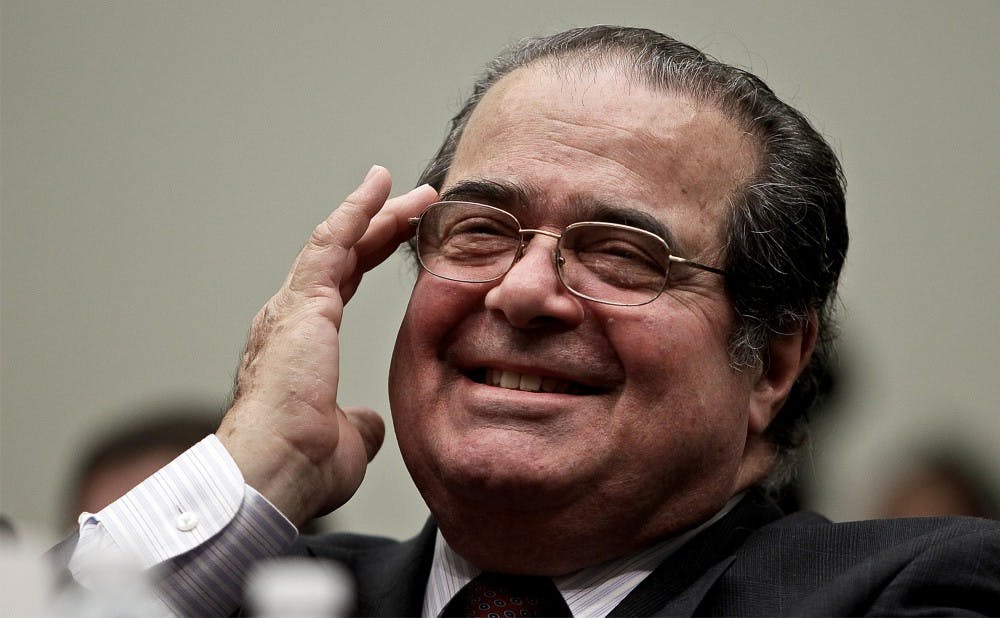Political science professors questioned how Supreme Court Justice Antonin Scalia’s death impacts electoral politics in a panel discussion Monday.
The panel featured professors with backgrounds in American politics and constitutional law including John Aldrich, Pfizer-Pratt university professor of political science; David Rohde, Ernestine Friedl professor of political science; and Neil Siegel, David W. Ichel professor of law. Ruth Grant, professor of political science and philosophy, moderated the discussion.
The panelists explained that Scalia’s death has posed unique strategic challenges for both the Republican and Democratic parties in the midst of a polarized presidential election cycle, because any potential nominees could attain significant influence on future court opinions. Aldrich spoke about how uncertainty in terms of what ideological direction the Supreme Court will take is mirrored by the potential for ideological change during the upcoming presidential and congressional elections.
“The reason this is a potentially interesting conundrum is that this year all three of these major institutions are up for grabs in terms of what direction they will go,” Aldrich said. “That doesn’t happen very often.”
Scalia’s funeral was held in Washington Saturday after he passed away Feb. 13. The panelists discussed how President Barack Obama might go about making a strategic nomination to fill Scalia’s spot, and how Republicans in the Senate might respond to any potential nominations.
The panelists focused on several questions—including what kind of justice Obama will nominate, the relative likelihood of that nomination being approved by the Republican-controlled Senate and how this nomination process influences the 2016 presidential election.
Rohde pointed out that Republican Sen. Mitch McConnell was quick to state that Obama should not appoint a new justice and should instead leave the decision up to the next president. He explained that the partisan conflict over the decision of whether or not to nominate a justice leads to the current division in public opinion about the issue.
“We live in a polarized America by party, and this issue strongly relates to the kinds of policies party activists want to see enacted and they recognize the influence of the Supreme Court for that—so we start with a lot of conflict,” Rohde said.
Aldrich and Rohde characterized the decision of who to nominate as an urgent choice for Democrats because of the looming uncertainty of who a Republican president would nominate. Both professors explained that a Democratic nominee would likely be someone overly qualified to get past the nomination process.
“It’s very likely to affect spillover into electoral politics and that’s unusual,” Aldrich said. “We’re likely to see a great deal of campaigning that is related to the issue of the Supreme Court.”
Rohde said that the Democrats may use the vacancy to relate to policy issues as a method of encouraging voter turnout among black voters, in an attempt to attain similar turnout to what Obama received among that demographic in 2012.
Siegel on the other hand, did not place as strong of an emphasis on the decision.
“This idea that right now we’re deciding the fate of the Supreme Court for generations I think is overwhelmingly likely to be untrue,” Siegel said.
He explained that regardless of whether the current vacancy is filled, the next president and the next Senate will have relatively more influence in deciding what the court is going to look like.
“It’s not just going to be based on this vacancy—this could last a year or two,” Siegel said. “Justice Ginsburg is 82 years old, Justice Kennedy is 79 years old, Justice Breyer is 77 years old, so what do you think the chances are that the next president and the next Senate is going to consider the possibility of replacing one of them?”
Senior Molly Walker wrote in an email that it was valuable to hear this variation in viewpoint about the relative level of influence of the next nominee.
“Hearing Professor Siegel’s assessment of the vacancy as one that has had its significance ‘overstated’ by the media put the current debate into context by highlighting the inevitable vacancies that are likely to occur in the coming years,” Walker wrote.
Get The Chronicle straight to your inbox
Signup for our weekly newsletter. Cancel at any time.

